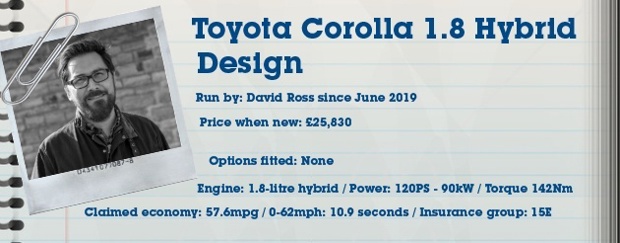Out with the Auris, in with the Corolla
Toyota has ditched the Auris badge for its family hatchback and returned to a classic name from its past.
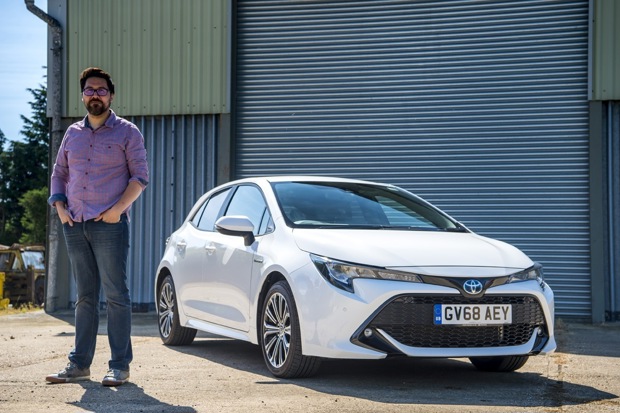
Date: 11 June 2019 | Current mileage: 3275 | Claimed economy: 57.6mpg | Actual economy: 59.8mpg
I'll be honest, I wasn't exactly hugely excited with the prospect of a Corolla Hybrid for several months. It's not the fact that it's a hybrid - I like a hybrid and ran a GS450h several years ago which was excellent. It's just I remember how crushingly dull the Auris was.
I drove an Auris on the original launch in 2007 and my lasting memory, if you can call it that, was just how instantly forgettable it was. Apart from the horrible silver plastic interior trim, which isn't exactly the best thing to remember a car for.
I've driven several version of the subsequent generation Auris and while I know that they're reliable, good value and all those things that make a rational purchase, they've always left me cold. But the Corolla is very different.
I have to say it has won me over. After just a week behind the wheel I'm enjoying every minute of it. I like the look of it, the interior and the way it drives. It even handles well. True, it's not perfect (I'll come onto those things in later updates) but for me, it's a revelation compared to the Auris.
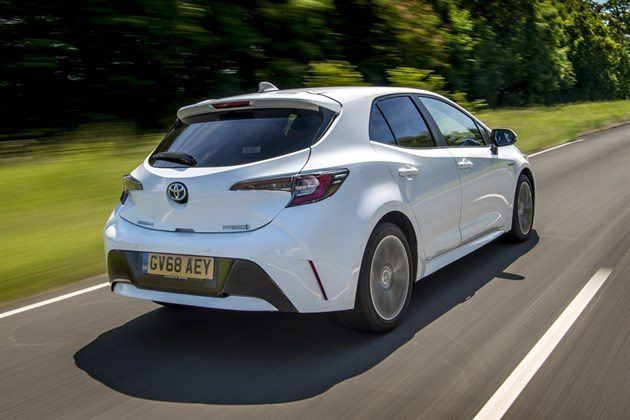
Ours is a 1.8-litre Hybrid and while there's a more powerful 2.0-litre Hybrid now available, the standard model rarely feels short of power. But it's the synergy between the petrol engine and the electric motor that makes the Corolla so good. Toyota has long been the champion of hybrid technology and that shows in the Corolla. It's smooth, quiet and quick.
We've gone for a mid-level Design model in Pure White (the standard no extra cost paint) which is £25,830 on the road. That may seem quite pricey but it's so well equipped we haven't had to add any options on. Not that there are many, aside from a panoramic roof and black or chrome styling packs.
As standard, the Design gets privacy glass, front and rear parking sensors with a rear camera, intelligent adaptive cruise control, navigation (as part of the much improved Toyota Touch 2 multimedia system), dual zone air con and heated front seats. Things it doesn't have? Apple CarPlay or Android auto, frustratingly.
I'm looking forward to having something more economical after the rather thirsty Volvo XC60 T5 and the Corolla has started well - we're seeing close to 60mpg already, which is actually better than the official WLTP figure of 57.6mpg. So far, the Corolla is off to a very promising start.
Is the new Corolla a practical family hatch?
As well as being economical, a big part of the Corolla's brief is to fit the bill as a practical family hatchback. So does it succeed?
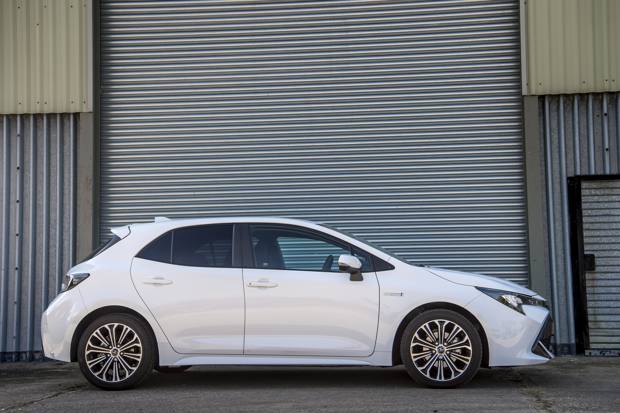
Date: 25 June 2019 | Current mileage: 3482 | Claimed economy: 57.6mpg | Actual economy: 60.0mpg
While the Corolla may major on being a hybrid (more than 90% of models sold are hybrids), the one brief the Toyota has to fulfill for many - including me - is that of family hatchback. Like many people, our car is a multi purpose family vehicle that's used for commuting, school runs, days out, holidays and everything else.
So while space is important, it's the way this space is utilised that's more crucial to many. And the one thing that has already highlighted itself as a weak point in the Corolla is the boot. It's not the actual boot space itself, that's a decent size at 361 litres which is more than a Ford Focus and not far short of a Volkswagen Golf.
The issue is with the rear design of the Corolla and in particular the angle of the tailgate. While it makes for a swoopy looking rear end look, it means you have to lean forward to get to the boot, which is further hindered by an oddly big back bumper.
Another consequence is that it's quite hard to shut the boot in one movement. The smooth shape and angle mean it's hard to push down from the outside while the inner handle requires some Houdini-esque joint movements in your wrist. Again you have lean forward and inevitably end up with your legs right on the bumper which isn't nice if it's dirty and you've got your best Wham style white jeans on...
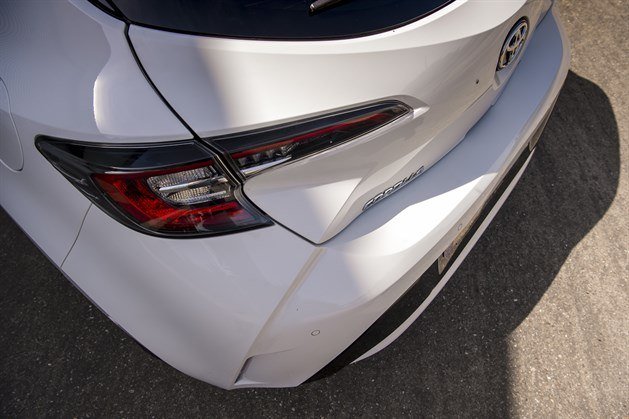
The rear seats fold down but it's not a flat floor and there are intrusions from the side which mean it's not that easy to carry big or boxy things home from Ikea. That combined with a high load lip makes this a not especially user-friendly cargo area.
For me so far that's the Corolla's biggest weakness. There is of course an estate version - or as Toyota calls it, Touring Sports - which has a much more useable boot. But I still think the hatchback should be better - it lags behind rivals like the excellent Honda Civic here.
There are also the non-existent rear door pockets, replaced instead by a cupholder. That usually wouldn't be much of an issue, but when you have a four-year old daughter who likes somewhere to carry around all the 'essentials' for a journey (colouring books, all the crayons you possess, a small toy lion, extra shoes and a slinky), a small cupholder just doesn't cut it.
The good news is that the Corolla is spacious inside for a hatchback this size. At 6ft2 I can sometimes feel a little cramped in a hatchback, but there's no issues with the Toyota. The seats are really comfortable too with plenty of side support, which I've started to appreciate during longer journeys in our Corolla.
What's in a name?
Toyota made a big deal when it launched the Auris to replace the Corolla in 2007. So how come the change back?
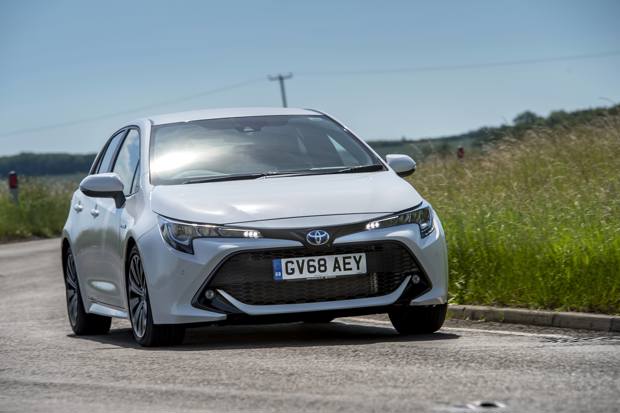
Date: 16 July 2019 | Current mileage: 4011 | Claimed economy: 57.6mpg | Actual economy: 59.7mpg
There's a story that used to do the rounds, although it's likely the motoring equivalent of an urban myth, about why Toyota changed the name of its family hatch from the familiar Corolla - a name it had used since the 1960s - to Auris in 2007.
It was back in 2006 and Toyota was set to launch its new generation Corolla. A badge used throughout the world and in fact the the best-selling car in the world. The new model would carry on where the previous generation left off, as a sensible and reliable hatchback.
Toyota's rival Honda also had its own dependable hatchback in the shape of the Civic. Type R aside, it hardly had much in the way of youth appeal, something shared with the Corolla. These were cars most people bought with their heads rather than their hearts.
While car manufacturers will often show off concept models, the final design and look of a car is closely guarded secret, particularly from rival brands. So it wasn't until well into the design phase that Toyota caught a glimpse of the new Civic.
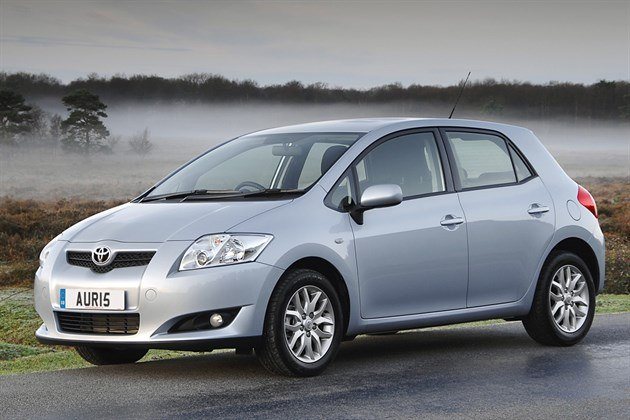
Compared to its run of the mill predecessor, the 2006 Civic was revolutionary, both inside and out. It's a car I regard as one of the best of the last two decades. In fact I've owned two and loved both. But Toyota wasn't expecting it.
The story goes that Toyota was caught on the hop by how radically different the Civic was and realised how staid it made the Corolla look. But as it was so far down the design route, Toyota and its design team had no choice but to continue.
While it couldn't change the look of the new hatch - it could change the name. So it ditched Corolla in favour of a new name, Auris, based on aurum, the Latin word for gold. The hope being that buyers would see it as a brand new model.
Despite the fancy name, the original Auris was not exactly ground breaking and didn't capture the imagination as the Civic did. And while the second generation was much improved it hardly set pulses racing either. Fortunately, the new Corolla is much better. Maybe by ditching Auris, Toyota is aiming to rekindle the affection the Corolla badge had.
A genuinely economical hatchback
Claimed fuel economy figures are always to be taken with a pinch of salt, but our Corolla is actually exceeding the official MPG figures.
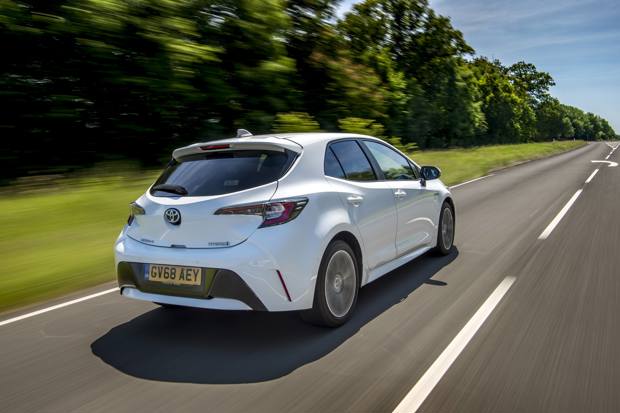
Date: 30 July 2019 | Current mileage: 4656 | Claimed economy: 57.6mpg | Actual economy: 61.6mpg
The official fuel economy figures given by manufacturers for their latest models have always been figures to 'aspire to' rather than ones that are actually achieveable. It's something we have come to be used to over the years. While they are a way of comparing whether one car is more economical than another, the chances of seeing the claimed MPG are pretty much zero.
Much of that was down to the old fuel economy test, but changes in 2017 brought a new test process called WLTP and the promise of more realistic figures. If you really want to read more about it, you can knock yourself out here.
What we have seen is a decrease in the claimed economy figures as the new test delivers the kind of MPG figures that drivers may actually achieve. Which after years of pie in the sky numbers, is a revelation.
Our Corolla 1.8 Hybrid Design has an official figure of 57.6mpg. Compare that to the previous Auris Hybrid which claimed close to 80mpg from a similar 1.8-litre hybrid system and you can see how WLTP is certainly making a difference.
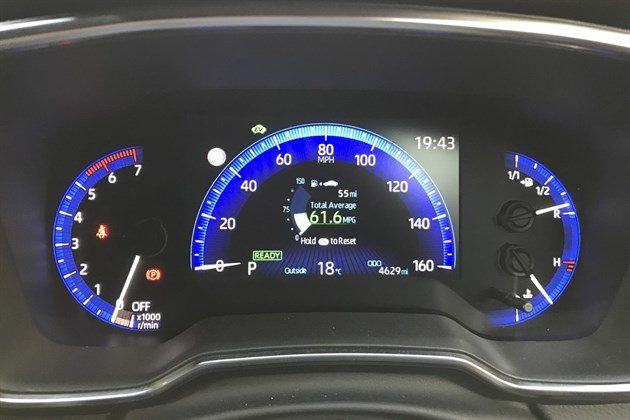
And that's really the key thing. Our Corolla is averaging more than 60mpg at the moment which is mightily impressive for a car that's driven around town. However, you'd be disappointed if it claimed to do 80mpg. Hopefully the new MPG test will give us figures we can actually expect to see without driving like a grandma.
And that's the thing. I haven't driven the Corolla any different from any other car I've had. I've certainly not driven it in an especially economical way, yet it still returns 60mpg. That does drop if I spend a lot of time on the A1 (the section near me is littered with roundabouts) but only by a few miles per gallon.
And despite that economy, the Corolla is not slow. While we didn't go for the more 'sporty' 2.0-litre hybrid, I don't feel short changed in the 1.8-litre. It's go plenty of get up and go when needed. The best thing is that despite having a CVT gearbox, there's hardly any of that continual engine noise that often accompanies any attempt to accelerate. In fact, the engine is very quiet the majority of the time.
I will be testing a few hybrids soon, including the new Lexus UX and the Corolla Touring Sports with aforementioned 2.0-litre hybrid, to see how they compare to our Corolla. For now though, I'm enjoying rarely having to fill the thing up with fuel.
Corolla interior - excellent but with some caveats...
The cabin of the Corolla is a big improvement and one of the best quality interiors around - but it's not perfect.
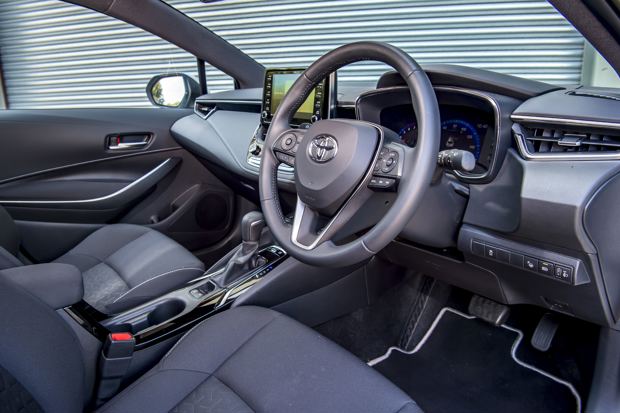
Date: 13 August 2019 | Current mileage: 4892 | Claimed economy: 57.6mpg | Actual economy: 61.4mpg
Toyota has always had a certain reputation when it comes to interiors. That of building cars that you know are well built inside, but are also drab, uninspiring and oh so boring. It's not exactly thrown that book out of the window with the Corolla, but it's certainly a step towards creating a more inviting cabin.
Compared to the functional Auris, this Corolla is, dare we say it, aesthetically pleasing. There are less clunky buttons and hard plastics, replaced by something that feels far more premium. It's even binned off the 1980s-style digital clock that looked like it was from some old Casio watch.
For a country that embraces technology, it is odd that many Japanese cars have such dated interiors. Especially when what's underneath is so cutting edge. Toyota after all was the manufacturer that brought us the the hybrid. But the Corolla feels as nice as a Golf or a Focus, with soft touch materials, yet it's still hardwearing and solid.
What remains a mystery though, is why the infotainment system is still so unattractive and looks like it's from 10 years ago. It's simple enough to use but our biggest gripe is the lack of Apple CarPlay or Android Auto. It means you can't quickly use Google Maps or Waze for navigation - instead having to rely on the far inferior Toyota system.
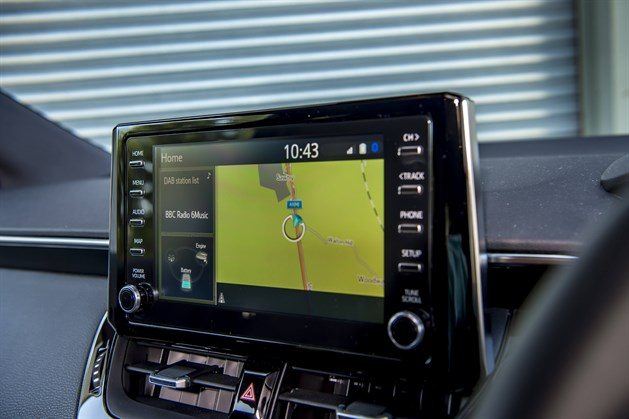
At 41, I'm hardly at the vanguard of new technology, but even I realise that finding a location such as a shop or restaurant via Google Maps is far simpler (and more accurate) than old school navigation systems. That wouldn't be too bad but it's not as if the Toyota system is nice to use or attractively designed.
Compare it to what you get in a Volkswagen Golf, what is arguably the best infotainment system around, Toyota's seems two steps behind. I can at least connect my iPhone via a cable and listen to Audible or Spotify but I still have to control them through my phone.
My other gripe with the Toyota is the lack of a digital speedo. Given the fact it can tell you your average economy, whether the hybrid system is being charged and probably your daily horoscope, it's baffling that there's no digital speedo - something which has become the norm in this market.
But what I can't complain about is comfort. From the supportive seats to the excellent driving position, the Corolla is proving a great car for long distances and being 6ft2 tall, there's plenty of room for me. The Corolla certainly feels a huge step forward from the Auris but there are still some small things that stop it being superb.
Our time with the Corolla is up
The Corolla is leaving us after three months and we're going to miss its blend of comfort and quality.
Date: 31 August 2019 | Current mileage: 5117 | Claimed economy: 57.6mpg | Actual economy: 61.9mpg
It has been a brief three month stint with our Toyota Corolla but the end has come too soon for me. Because the Corolla has changed my perception of what a small hybrid can be like. As I admitted when it first arrived with us, I wasn't that enamoured by the prospect of having a Corolla Hybrid as a long termer.
But the Toyota has completely won me over. It's not that it's a just a very impressive hybrid, but a very impressive car overall. Time was when going for a hybrid meant having to compromise, but that's not the case with the Corolla.
It does of course have all the positive traits of a hybrid. It's quiet, smooth and great around town, plus of course it's very economical. We've seen more than 60mpg average over the past few months which is the best economy I've had from a long termer in a very long time.
But it's perhaps the performance that has impressed me most. The Corolla is a relaxing car the majority of the time, but it also delivers when you ask it to accelerate. Ours may be the standard 1.8 Hybrid rather than the more powerful 2.0-litre model, but it still feels plenty quick enough, not just from a standstill but at motorway speeds too.
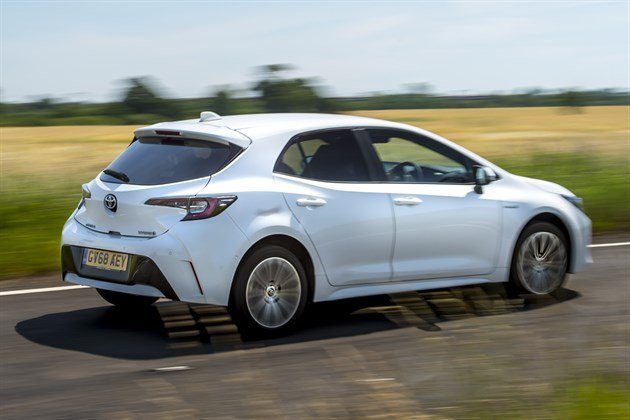
The one area that is a letdown for me is practicality. The boot is big enough, despite intrusions from the side, but the weird angled tailgate means it's hard to shut and you have to lean in over a protruding bumper to reach right to the furthest point of the boot. Which invariably is exactly where whatever a demanding four-year old wants.
The rear feels cramped too, especially compared to a Honda Civic, what we regard as one of the best hatchbacks around. It's these small niggles which stop the excellent Corolla being a perfect family car in my opinion.
But that aside, it's very easy to recommend the Corolla. It drives well, is cheap to run and being a Toyota, is of course very unlikely to ever go wrong. It's a huge step forward from the Auris and is definitely one of the finest cars Toyota has produced in a long time.
The Toyota is being replaced by a big diesel Audi A6. Yes it means far more room but I'm already missing the Corolla and how easy it is to drive. If you're after a high quality hatchback, this has to be right up there on your list.

